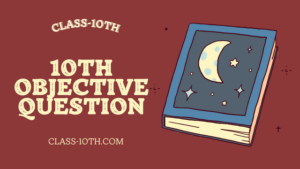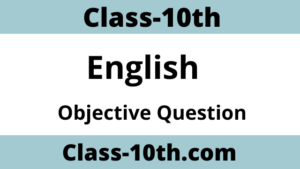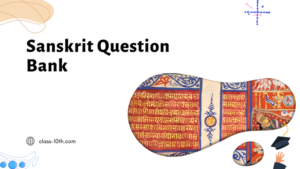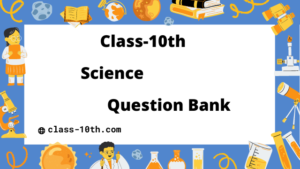Class 10th English Poetry Objective Question Chapter 2 (vvi Objective) (अंग्रेज़ी) बिहार बोर्ड कक्षा 10 अंग्रेज़ी अध्याय 2 (Ode On Solitude) (ओड ऑन सालिटूड) का अब्जेक्टिव प्रश्न पीडीएफ़ Bihar Board (Matric मैट्रिक) vvi Objective in Hindi pdf
Ode On Solitude
1. In the essay poem “Ode On Solitude’, where is the happy man content to live? [2019C]
(A) In town
(B) In his own ground
(C) In the heaven
(D) In an orchard
Ans.(B)
2. In the poem ‘Ode On Solitude’ the poet draws a beautiful picture of – [2019A)
(A) a village
(B) a poor man
(C) a happy man
(D) a town
Ans.(C)
3. Pope, in the poem ‘Ode on Solitude’, says that village people get everything except-
[2019A)
(A) Milk from herds
(B) Bread from fields
(C) Attire from flocks
(D) Money from trees
Ans.(D)
4. Who has composed the poem ‘Ode on Solitude ? (2018C]
(A) Puran Singh
(B) Durga Prasad Panda
(C) Alexander Pope
(D) William Cowper
Ans.(C)
5. “Ode on Solitude’ is written by……….
[2018A]
(A) Alexander Pope
(B) Milton
(C) Rupert Brooke
(D) Walter de la Mare
Ans.(A)
6. A happy man’s wants are satisfied by the property inherited by him from his ……………
(A) Uncle
(B) Mother
(C) Cousin
(D) Father
Ans.(D)
7. Alexander Pope was born in
(A) 1588
(B) 1688
(C) 1788
(D) 1678
Ans.- (B)
8. The happy man is content to live in his own
(A) Tree
(B) Town
(C) Ground
(D) None
Ans.(C)
9. What do the trees yield to a person in summer ?
(A) Wood
(B) Fire
(C) Fruit
(D) Shade
Ans. (D)
10. How do hours, days and years of a blessed man pass away ?
(A) Softly
(B) Hardly
(C) Coldly
(D) Frankly
Ans.(A)
11. Whose flocks supply him with attire, here flock means.
(A) Sheep
(B) Cow
(C) Dog
(D) Elephant
Ans. (D)
12. Alexander Pope died in
(A) 1888
(B) 1848
(C) 1744
(D) 1724
Ans.(C)
13. The poet does not want anything to mark the place where he is
(A) Buried
(B) Sitting
(C) Hiding
(D) Lost
Ans.(A)
14. A poem addressed to a person or thing or celebrating of an event
(A) Satire
(B) Ode
(C) Ballad
(D) Elegy
Ans.(B)
15. How does the poet, Alexander Pope, want to live?
(A) Unseen
(B) Unknown
(C) Both (A) & (B)
(D) None of these
Ans.-(C)
16. The poet of ‘The Rape of the Lock’ is
(A) William Cowper
(B) Alexander Pope
(C) William de la Mare
(D) John Keats
Ans. (B)
17. Where does the happy man live, according to this poem?
(A) In forest
(B) In towns
(C) In his native land
(D) None of these
Ans.(C)
18. Who gives him bread ?
(A) Market
(B) Field
(C) Farmer
(D) None of these
Ans.-(B)
19’Essay on Criticism’ is the famous work of
(A) John Keats
(B) Shakespeare
(C) W. Wordsworth
(D) Alexander Pope
Ans.(D)
20. The happy man owns inherited
(A) World
(B) Property
(C) Poem
(D) Solitude
Ans. (B)
21. Meditation…………. the happy man.
(A) Saddens
(B) Worries
(C) Pleases
(D) Disturbs
Ans.-(C)
22. How is he content?
(A) To live peacefully
(B) To live with comfort
(C) To live with luxury
(D) None of these
Ans.-(A)
23. What do you mean by ‘slide soft away?
(A) Go away
(B) Pass away smoothly
(C) Pass away
(D) None of these
Ans.(B)
24. “Loneliness’ is same in meaning as
(A) Satire
(B) Profound
(C) Solitude
(D) Mob
Ans.(C)
25. How does the poet desire to sleep?
(A) So long
(B) Soundly
(C) Sleep for less hours
(D) None of these
Ans.(B)
26. Hours, days and years slide away …………….. for the happy man.
(A) Hard
(B) Quickly
(C) Softly
(D) Tensely
Ans.(C)
27. Alexander Pope was one of the greatest……… of the early 18th century.
(A) Dramatists
(B) Novelists
(C) Writers
(D) Satirists
Ans.(D)
28. “Steal from the world, and not a stone’-here stone means………..
(A) Piece of a rock
(B) A tomlastone
(C) A poluable
(D) A marble stone
Ans.(B)
29. Who is a happy man ?
(A) Who is wealthy
(B) Who is brave
(C) Who is content with his paternal land and belongings
(D) Who is careful
Ans.(C)
30. From where does he get his cloths ?
(A) From bamboos
(B) From his flocks of sheep
(C) From leathers of animals
(D) None of these
Ans.(B)





